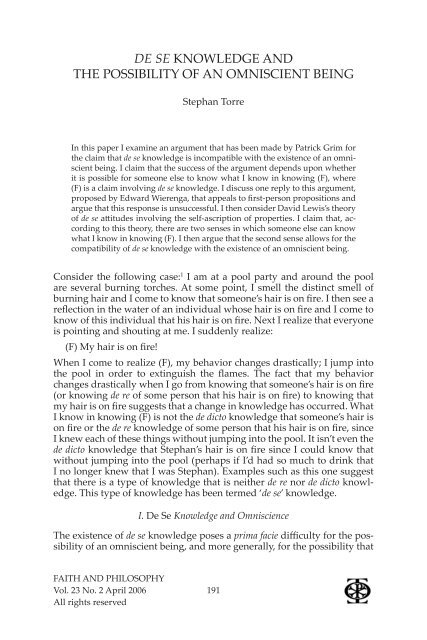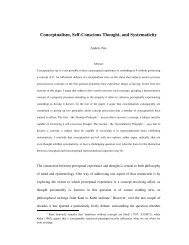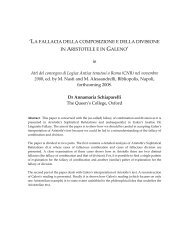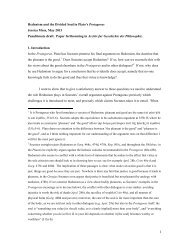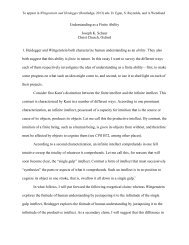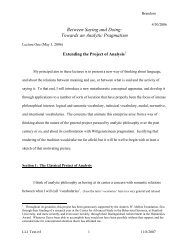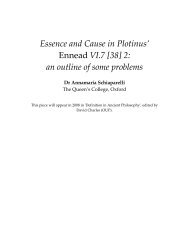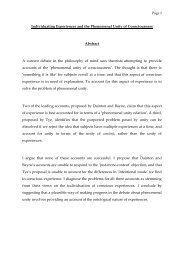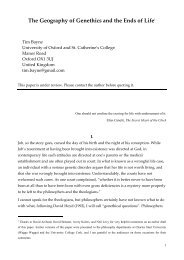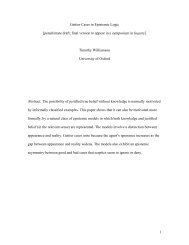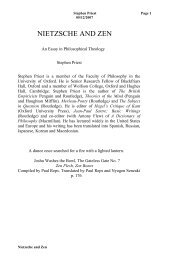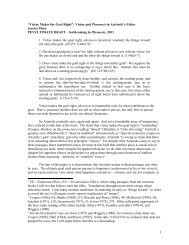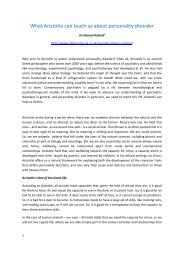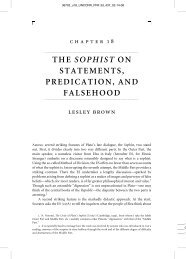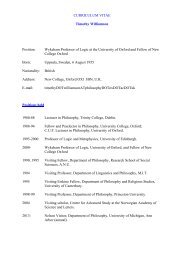de se knowledge and the possibility of an omniscient being
de se knowledge and the possibility of an omniscient being
de se knowledge and the possibility of an omniscient being
Create successful ePaper yourself
Turn your PDF publications into a flip-book with our unique Google optimized e-Paper software.
DE SE KNOWLEDGE AND<br />
THE POSSIBILITY OF AN OMNISCIENT BEING<br />
Steph<strong>an</strong> Torre<br />
In this paper I examine <strong>an</strong> argument that has been ma<strong>de</strong> by Patrick Grim for<br />
<strong>the</strong> claim that <strong>de</strong> <strong>se</strong> <strong>knowledge</strong> is incompatible with <strong>the</strong> existence <strong>of</strong> <strong>an</strong> <strong>omniscient</strong><br />
<strong>being</strong>. I claim that <strong>the</strong> success <strong>of</strong> <strong>the</strong> argument <strong>de</strong>pends upon whe<strong>the</strong>r<br />
it is possible for someone el<strong>se</strong> to know what I know in knowing (F), where<br />
(F) is a claim involving <strong>de</strong> <strong>se</strong> <strong>knowledge</strong>. I discuss one reply to this argument,<br />
propo<strong>se</strong>d by Edward Wierenga, that appeals to first-person propositions <strong><strong>an</strong>d</strong><br />
argue that this respon<strong>se</strong> is unsuccessful. I <strong>the</strong>n consi<strong>de</strong>r David Lewis’s <strong>the</strong>ory<br />
<strong>of</strong> <strong>de</strong> <strong>se</strong> attitu<strong>de</strong>s involving <strong>the</strong> <strong>se</strong>lf-ascription <strong>of</strong> properties. I claim that, according<br />
to this <strong>the</strong>ory, <strong>the</strong>re are two <strong>se</strong>n<strong>se</strong>s in which someone el<strong>se</strong> c<strong>an</strong> know<br />
what I know in knowing (F). I <strong>the</strong>n argue that <strong>the</strong> <strong>se</strong>cond <strong>se</strong>n<strong>se</strong> allows for <strong>the</strong><br />
compatibility <strong>of</strong> <strong>de</strong> <strong>se</strong> <strong>knowledge</strong> with <strong>the</strong> existence <strong>of</strong> <strong>an</strong> <strong>omniscient</strong> <strong>being</strong>.<br />
Consi<strong>de</strong>r <strong>the</strong> following ca<strong>se</strong>: 1 I am at a pool party <strong><strong>an</strong>d</strong> around <strong>the</strong> pool<br />
are <strong>se</strong>veral burning torches. At some point, I smell <strong>the</strong> distinct smell <strong>of</strong><br />
burning hair <strong><strong>an</strong>d</strong> I come to know that someone’s hair is on fire. I <strong>the</strong>n <strong>se</strong>e a<br />
reflection in <strong>the</strong> water <strong>of</strong> <strong>an</strong> individual who<strong>se</strong> hair is on fire <strong><strong>an</strong>d</strong> I come to<br />
know <strong>of</strong> this individual that his hair is on fire. Next I realize that everyone<br />
is pointing <strong><strong>an</strong>d</strong> shouting at me. I sud<strong>de</strong>nly realize:<br />
(F) My hair is on fire!<br />
When I come to realize (F), my behavior ch<strong>an</strong>ges drastically; I jump into<br />
<strong>the</strong> pool in or<strong>de</strong>r to extinguish <strong>the</strong> flames. The fact that my behavior<br />
ch<strong>an</strong>ges drastically when I go from knowing that someone’s hair is on fire<br />
(or knowing <strong>de</strong> re <strong>of</strong> some person that his hair is on fire) to knowing that<br />
my hair is on fire suggests that a ch<strong>an</strong>ge in <strong>knowledge</strong> has occurred. What<br />
I know in knowing (F) is not <strong>the</strong> <strong>de</strong> dicto <strong>knowledge</strong> that someone’s hair is<br />
on fire or <strong>the</strong> <strong>de</strong> re <strong>knowledge</strong> <strong>of</strong> some person that his hair is on fire, since<br />
I knew each <strong>of</strong> <strong>the</strong><strong>se</strong> things without jumping into <strong>the</strong> pool. It isn’t even <strong>the</strong><br />
<strong>de</strong> dicto <strong>knowledge</strong> that Steph<strong>an</strong>’s hair is on fire since I could know that<br />
without jumping into <strong>the</strong> pool (perhaps if I’d had so much to drink that<br />
I no longer knew that I was Steph<strong>an</strong>). Examples such as this one suggest<br />
that <strong>the</strong>re is a type <strong>of</strong> <strong>knowledge</strong> that is nei<strong>the</strong>r <strong>de</strong> re nor <strong>de</strong> dicto <strong>knowledge</strong>.<br />
This type <strong>of</strong> <strong>knowledge</strong> has been termed ‘<strong>de</strong> <strong>se</strong>’ <strong>knowledge</strong>.<br />
I. De Se Knowledge <strong><strong>an</strong>d</strong> Omniscience<br />
The existence <strong>of</strong> <strong>de</strong> <strong>se</strong> <strong>knowledge</strong> po<strong>se</strong>s a prima facie difficulty for <strong>the</strong> <strong>possibility</strong><br />
<strong>of</strong> <strong>an</strong> <strong>omniscient</strong> <strong>being</strong>, <strong><strong>an</strong>d</strong> more generally, for <strong>the</strong> <strong>possibility</strong> that<br />
FAITH AND PHILOSOPHY<br />
Vol. 23 No. 2 April 2006 191<br />
All rights re<strong>se</strong>rved
192 Faith <strong><strong>an</strong>d</strong> Philosophy<br />
some o<strong>the</strong>r individual c<strong>an</strong> know what I know when I come to have <strong>de</strong><br />
<strong>se</strong> <strong>knowledge</strong>. Patrick Grim pre<strong>se</strong>nts <strong>the</strong> difficulty that <strong>de</strong> <strong>se</strong> <strong>knowledge</strong><br />
rai<strong>se</strong>s for omniscience as follows:<br />
In or<strong>de</strong>r to qualify as <strong>omniscient</strong> or all-knowing, a <strong>being</strong> must know<br />
at least all that is known. Such a <strong>being</strong> must, <strong>the</strong>n, know what I know<br />
in knowing [(F)]. . . . But what I know in such a ca<strong>se</strong>, it appears, is<br />
known by no <strong>omniscient</strong> <strong>being</strong>. The in<strong>de</strong>xical ‘I’ . . . is es<strong>se</strong>ntial to<br />
what I know in knowing [(F)]. But only I c<strong>an</strong> u<strong>se</strong> that ‘I’ to in<strong>de</strong>x<br />
me—no <strong>being</strong> distinct from me c<strong>an</strong> do so. I am not <strong>omniscient</strong>. But<br />
<strong>the</strong>re is something that I know that no <strong>being</strong> distinct from me c<strong>an</strong><br />
know. Nei<strong>the</strong>r I nor <strong>an</strong>y <strong>being</strong> distinct from me, <strong>the</strong>n, is <strong>omniscient</strong>:<br />
<strong>the</strong>re is no <strong>omniscient</strong> <strong>being</strong>. 2<br />
Grim’s argument c<strong>an</strong> be restated as follows:<br />
(1) I come to know something, namely (F), when I realize that my hair<br />
is on fire.<br />
(2) No one el<strong>se</strong> c<strong>an</strong> know what I know in knowing (F).<br />
(3) I am not <strong>omniscient</strong>.<br />
(4) If I know something that no one el<strong>se</strong> c<strong>an</strong> know <strong><strong>an</strong>d</strong> I am not <strong>omniscient</strong><br />
<strong>the</strong>n no <strong>being</strong> is <strong>omniscient</strong>.<br />
(5) Therefore, no <strong>being</strong> is <strong>omniscient</strong>.<br />
Given <strong>the</strong> validity <strong>of</strong> Grim’s argument, <strong>the</strong> <strong>de</strong>fen<strong>de</strong>r <strong>of</strong> <strong>the</strong> <strong>possibility</strong> <strong>of</strong><br />
<strong>an</strong> <strong>omniscient</strong> <strong>being</strong> must reject one <strong>of</strong> <strong>the</strong> premi<strong>se</strong>s. The ‘hair-on-fire’ example<br />
above <strong><strong>an</strong>d</strong> o<strong>the</strong>rs like it successfully <strong>de</strong>monstrate that premi<strong>se</strong> (1)<br />
is true: <strong>the</strong>re is something I come to know when I realize that my hair<br />
is on fire. 3 Premi<strong>se</strong> (3) is obvious enough. Premi<strong>se</strong> (4) follows from <strong>the</strong><br />
<strong>de</strong>finition <strong>of</strong> omniscience <strong><strong>an</strong>d</strong> logic. The only premi<strong>se</strong> that <strong>se</strong>ems up for<br />
dispute is premi<strong>se</strong> (2). 4 In this paper, I will explore whe<strong>the</strong>r it is possible<br />
for some individual distinct from my<strong>se</strong>lf to know what I know in knowing<br />
(F). I will consi<strong>de</strong>r two accounts <strong>of</strong> <strong>de</strong> <strong>se</strong> <strong>knowledge</strong>, one involving firstperson<br />
propositions <strong><strong>an</strong>d</strong> <strong>an</strong>o<strong>the</strong>r involving properties. I will conclu<strong>de</strong> that<br />
a <strong>the</strong>ory <strong>of</strong> first-person propositions that allows for <strong>the</strong> falsity <strong>of</strong> premi<strong>se</strong><br />
(2) has unacceptable con<strong>se</strong>quences. I will claim that on <strong>the</strong> properties account,<br />
<strong>the</strong>re are two <strong>se</strong>n<strong>se</strong>s in which someone el<strong>se</strong> c<strong>an</strong> know what I know<br />
in knowing (F): <strong>the</strong> first <strong>se</strong>n<strong>se</strong> does not <strong>of</strong>fer much hope for <strong>the</strong> <strong>possibility</strong><br />
<strong>of</strong> <strong>an</strong> <strong>omniscient</strong> <strong>being</strong>, but <strong>the</strong> <strong>se</strong>cond one does.<br />
II. The First-person Propositions Account<br />
One way <strong>of</strong> un<strong>de</strong>rmining premi<strong>se</strong> (2) is to claim that <strong>de</strong> <strong>se</strong> <strong>knowledge</strong> is<br />
in fact reducible to <strong>de</strong> dicto <strong>knowledge</strong> <strong><strong>an</strong>d</strong> that this <strong>de</strong> dicto <strong>knowledge</strong> is<br />
knowable by <strong>being</strong>s distinct from me. Such <strong>an</strong> approach is adopted by Edward<br />
Wierenga in The Nature <strong>of</strong> God. 5 Wierenga takes as his starting point<br />
Ro<strong>de</strong>rick Chisholm’s account <strong>of</strong> <strong>de</strong> <strong>se</strong> <strong>knowledge</strong> as pre<strong>se</strong>nted in Person <strong><strong>an</strong>d</strong><br />
Object. 6 Chisholm introduces a special notion <strong>of</strong> entailment (I will follow<br />
Wierenga in referring to this special <strong>se</strong>n<strong>se</strong> as ‘entailc’) according to which
<strong>de</strong> <strong>se</strong> knowlege <strong><strong>an</strong>d</strong> <strong>an</strong> <strong>omniscient</strong> <strong>being</strong> 193<br />
a proposition p entailsc <strong>the</strong> property <strong>of</strong> <strong>being</strong> Q just in ca<strong>se</strong> p is necessarily<br />
such that (i) if it obtains <strong>the</strong>n something has <strong>the</strong> property <strong>of</strong> <strong>being</strong> Q <strong><strong>an</strong>d</strong><br />
(ii) whoever accepts p believes that something is Q. 7 Chisholm claims that<br />
in using a <strong>se</strong>ntence involving a first-person pronoun <strong>an</strong> individual grasps<br />
a first-person proposition. A first-person proposition is one that entailsc<br />
<strong>the</strong> individual’s individual es<strong>se</strong>nce or haecceity. Chisholm provi<strong>de</strong>s <strong>the</strong><br />
following <strong>de</strong>finition for ‘individual es<strong>se</strong>nce’ or ‘haecceity’:<br />
G is <strong>an</strong> individual es<strong>se</strong>nce (or haecceity) =Df. G is a property which<br />
is such that, for every x, x has G if <strong><strong>an</strong>d</strong> only if x is necessarily such<br />
that it has G, <strong><strong>an</strong>d</strong> it is impossible that <strong>the</strong>re is a y o<strong>the</strong>r th<strong>an</strong> x such<br />
that y has G. 8<br />
On Chisholm’s proposal, in believing (F) I believe a first-person proposition<br />
that entails <strong>the</strong> conjunction <strong>of</strong> my individual es<strong>se</strong>nce <strong><strong>an</strong>d</strong> <strong>the</strong> property<br />
<strong>of</strong> having hair that is on fire. Chisholm goes on to state <strong>the</strong> following<br />
“corollary” to his view: “whereas each person knows directly <strong><strong>an</strong>d</strong> immediately<br />
certain propositions implying his own individual es<strong>se</strong>nce, no one<br />
knows <strong>an</strong>y propositions implying <strong>the</strong> individual es<strong>se</strong>nce <strong>of</strong> <strong>an</strong>yone el<strong>se</strong>.” 9<br />
I will refer to this claim in what follows as ‘Chisholm’s Corollary.’ 10<br />
Clearly, Chisholm’s account <strong>of</strong> <strong>de</strong> <strong>se</strong> <strong>knowledge</strong> entails <strong>the</strong> truth <strong>of</strong><br />
premi<strong>se</strong> (2) <strong>of</strong> Grim’s argument. In particular, Chisholm’s Corollary states<br />
that no one but me c<strong>an</strong> grasp propositions that entailc my haecceity. If this<br />
is <strong>the</strong> ca<strong>se</strong>, <strong>the</strong>n no one c<strong>an</strong> know what I know in knowing (F) since (F) is<br />
a first-person proposition that entailsc my haecceity. Wierenga has argued<br />
that we c<strong>an</strong> accept Chisholm’s account <strong>of</strong> <strong>de</strong> <strong>se</strong> <strong>knowledge</strong> without accepting<br />
Chisholm’s Corollary. He claims that <strong>the</strong> <strong>the</strong>sis that only I c<strong>an</strong> know<br />
my first-person propositions:<br />
is not <strong>an</strong> es<strong>se</strong>ntial requirement <strong>of</strong> <strong>the</strong> reduction <strong>of</strong> <strong>de</strong> <strong>se</strong> belief to <strong>de</strong><br />
dicto; it is not [as Chisholm claims] a corollary <strong>of</strong> it. What is crucial to<br />
<strong>the</strong> reduction is that it should provi<strong>de</strong> as <strong>an</strong> object <strong>of</strong> my <strong>de</strong> <strong>se</strong> belief<br />
something that I c<strong>an</strong>not believe without believing something about<br />
my<strong>se</strong>lf; it is immaterial whe<strong>the</strong>r someone el<strong>se</strong> c<strong>an</strong> believe it, as long<br />
as whoever el<strong>se</strong> believes it does not end up with a belief about him<strong>se</strong>lf<br />
or her<strong>se</strong>lf. 11<br />
Wierenga accepts <strong>the</strong> part <strong>of</strong> Chisholm’s account according to which S’s<br />
having a <strong>de</strong> <strong>se</strong> belief that he him<strong>se</strong>lf or she her<strong>se</strong>lf is F involves believing a<br />
first-person proposition p that entailsc <strong>the</strong> conjunction <strong>of</strong> S’s haecceity <strong><strong>an</strong>d</strong><br />
<strong>the</strong> property F. However, he rejects <strong>the</strong> claim that p c<strong>an</strong> only be known by<br />
S. He provi<strong>de</strong>s <strong>the</strong> following formulation <strong>of</strong> belief <strong>de</strong> <strong>se</strong>:<br />
(W) A person, S, believes <strong>de</strong> <strong>se</strong> that he him<strong>se</strong>lf or she her<strong>se</strong>lf is F just<br />
in ca<strong>se</strong> <strong>the</strong>re is a haecceity E such that S has E <strong><strong>an</strong>d</strong> S believes a proposition<br />
entailingc <strong>the</strong> conjunction <strong>of</strong> E <strong><strong>an</strong>d</strong> F. 12<br />
It is consistent with (W) that someone el<strong>se</strong>, S, believes <strong>the</strong> same first-person<br />
proposition that I believe in believing (F) without S having a <strong>de</strong> <strong>se</strong> belief,
194 Faith <strong><strong>an</strong>d</strong> Philosophy<br />
since <strong>the</strong> haecceity entailedc by <strong>the</strong> first-person proposition is mine, not<br />
S’s. This allows Wierenga to reject premi<strong>se</strong> (2) <strong>of</strong> Grim’s argument since<br />
someone el<strong>se</strong> c<strong>an</strong> know what I know in knowing (F).<br />
It is true that if <strong>the</strong> proponent <strong>of</strong> first-person propositions rejects Chisholm’s<br />
Corollary, he <strong>the</strong>reby avoids Grim’s objection to omniscience.<br />
However, in rejecting <strong>the</strong> Corollary he also introduces subst<strong>an</strong>tial difficulties<br />
for his <strong>the</strong>ory. Recall that one <strong>of</strong> <strong>the</strong> main reasons for positing<br />
<strong>de</strong> <strong>se</strong> belief in <strong>the</strong> first place was to explain differences in behavior. It<br />
is only when I realize that my hair is on fire that I jump into <strong>the</strong> pool.<br />
If we reject Chisholm’s Corollary, we lo<strong>se</strong> <strong>the</strong> ability to explain differences<br />
in behavior in terms <strong>of</strong> differences in content. 13 According to <strong>the</strong><br />
view un<strong>de</strong>r consi<strong>de</strong>ration, when I know (F) I know some first-person<br />
proposition that entailsc <strong>the</strong> conjunction <strong>of</strong> my haecceity <strong><strong>an</strong>d</strong> <strong>the</strong> property<br />
<strong>of</strong> having hair that is on fire. Suppo<strong>se</strong> that someone el<strong>se</strong> at <strong>the</strong> party,<br />
Sus<strong>an</strong>, is also able to grasp this first-person proposition. She will grasp<br />
a proposition that entails c<br />
my haecceity <strong><strong>an</strong>d</strong> <strong>the</strong> property <strong>of</strong> having hair<br />
that is on fire. Knowing this proposition will not lead her to jump in <strong>the</strong><br />
pool. The content <strong>of</strong> her <strong>knowledge</strong> will be <strong>the</strong> same as <strong>the</strong> content <strong>of</strong><br />
my <strong>knowledge</strong>, but her behavior will be different from my behavior. 14<br />
Therefore, rejecting Chisholm’s Corollary me<strong>an</strong>s rejecting <strong>the</strong> plausible<br />
supposition that differences in behavior are explainable in terms <strong>of</strong> differences<br />
in content.<br />
Secondly, <strong>an</strong> example from David Lewis shows that (W) is <strong>an</strong> unacceptable<br />
reduction <strong>of</strong> <strong>de</strong> <strong>se</strong> <strong>knowledge</strong> to <strong>de</strong> dicto <strong>knowledge</strong>. Lewis writes:<br />
Consi<strong>de</strong>r <strong>the</strong> ca<strong>se</strong> <strong>of</strong> two gods. They inhabit a certain possible world,<br />
<strong><strong>an</strong>d</strong> <strong>the</strong>y know exactly which world it is. Therefore <strong>the</strong>y know every<br />
proposition that is true at <strong>the</strong>ir world. Ins<strong>of</strong>ar as <strong>knowledge</strong> is a<br />
propositional attitu<strong>de</strong>, <strong>the</strong>y are <strong>omniscient</strong>. Still I c<strong>an</strong> imagine <strong>the</strong>m<br />
to suffer ignor<strong>an</strong>ce: nei<strong>the</strong>r one knows which <strong>of</strong> <strong>the</strong> two he is. They<br />
are not exactly alike. One lives on top <strong>of</strong> <strong>the</strong> tallest mountain <strong><strong>an</strong>d</strong><br />
throws down m<strong>an</strong>na; <strong>the</strong> o<strong>the</strong>r lives on top <strong>of</strong> <strong>the</strong> col<strong>de</strong>st mountain<br />
<strong><strong>an</strong>d</strong> throws down thun<strong>de</strong>rbolts. Nei<strong>the</strong>r one knows whe<strong>the</strong>r he lives<br />
on <strong>the</strong> tallest mountain or on <strong>the</strong> col<strong>de</strong>st mountain; nor whe<strong>the</strong>r he<br />
throws m<strong>an</strong>na or thun<strong>de</strong>rbolts. 15<br />
Since both gods know every proposition, <strong>the</strong>y both know every firstperson<br />
proposition. Let us refer to <strong>the</strong> haecceity <strong>of</strong> <strong>the</strong> god on <strong>the</strong> tallest<br />
mountain as ‘H.’ Call <strong>the</strong> proposition that entailsc <strong>the</strong> conjunction <strong>of</strong> H<br />
<strong><strong>an</strong>d</strong> <strong>the</strong> property <strong>of</strong> <strong>being</strong> on <strong>the</strong> tallest mountain ‘p.’ Both gods know p.<br />
By (W), <strong>the</strong> god on <strong>the</strong> tallest mountain’s <strong>knowledge</strong> <strong>of</strong> p is <strong>de</strong> <strong>se</strong> <strong>knowledge</strong>,<br />
whereas <strong>the</strong> god on <strong>the</strong> col<strong>de</strong>st mountain’s <strong>knowledge</strong> <strong>of</strong> p is not <strong>de</strong><br />
<strong>se</strong>, since p entailsc <strong>the</strong> former god’s haecceity <strong><strong>an</strong>d</strong> not <strong>the</strong> latter’s. But even<br />
though <strong>the</strong> god on <strong>the</strong> tallest mountain’s <strong>knowledge</strong> <strong>of</strong> p amounts to <strong>de</strong> <strong>se</strong><br />
<strong>knowledge</strong> according to (W), he still doesn’t know where he is by knowing<br />
only propositions. In or<strong>de</strong>r to know where he is, he would have to<br />
know that H is his haecceity. The fact that (W) entails that <strong>the</strong> god has <strong>de</strong> <strong>se</strong><br />
<strong>knowledge</strong>, even though he still doesn’t know where he is, <strong>de</strong>monstrates<br />
that <strong>the</strong> propo<strong>se</strong>d reduction <strong>of</strong> <strong>de</strong> <strong>se</strong> to <strong>de</strong> dicto fails. 16
<strong>de</strong> <strong>se</strong> knowlege <strong><strong>an</strong>d</strong> <strong>an</strong> <strong>omniscient</strong> <strong>being</strong> 195<br />
Although rejecting Chisholm’s Corollary does allow <strong>the</strong> proponent<br />
<strong>of</strong> first-person propositions to reject premi<strong>se</strong> (2) <strong>of</strong> Grim’s argument, it<br />
introduces new difficulties for <strong>the</strong> <strong>the</strong>ory. First, it requires one to ab<strong><strong>an</strong>d</strong>on<br />
<strong>the</strong> supposition that differences in behavior are explainable in terms<br />
<strong>of</strong> differences in content. Secondly, if o<strong>the</strong>rs are permitted to grasp my<br />
first-person propositions, <strong>the</strong> additional difficulty ari<strong>se</strong>s as to how I c<strong>an</strong><br />
know that my first-person propositions are mine ra<strong>the</strong>r th<strong>an</strong> someone<br />
el<strong>se</strong>’s. 17 Knowing this <strong>se</strong>ems to require knowing what my haecceity is,<br />
<strong><strong>an</strong>d</strong> this is <strong>knowledge</strong> that c<strong>an</strong>not be given in terms <strong>of</strong> propositions, firstperson<br />
or o<strong>the</strong>rwi<strong>se</strong>.<br />
III. The Properties Account<br />
David Lewis provi<strong>de</strong>s <strong>an</strong> alternative <strong>the</strong>ory <strong>of</strong> <strong>de</strong> <strong>se</strong> <strong>knowledge</strong> according<br />
to which <strong>the</strong> objects <strong>of</strong> <strong>de</strong> <strong>se</strong> attitu<strong>de</strong>s are properties. 18 In what follows I<br />
will discuss what implications this <strong>the</strong>ory has for premi<strong>se</strong> (2) <strong>of</strong> Grim’s<br />
argument. I will argue that, given Lewis’s <strong>the</strong>ory, <strong>the</strong>re are two different<br />
<strong>se</strong>n<strong>se</strong>s in which someone el<strong>se</strong> c<strong>an</strong> know what I know in knowing (F). Although<br />
both <strong>se</strong>n<strong>se</strong>s are sufficient for <strong>the</strong> rejection <strong>of</strong> premi<strong>se</strong> (2) <strong>of</strong> Grim’s<br />
argument, <strong>the</strong> proponent <strong>of</strong> <strong>the</strong> <strong>possibility</strong> <strong>of</strong> <strong>an</strong> <strong>omniscient</strong> God should<br />
claim that God is capable <strong>of</strong> knowing what I know in knowing (F) in <strong>the</strong><br />
<strong>se</strong>cond <strong>se</strong>n<strong>se</strong>.<br />
Lewis takes <strong>the</strong> objects <strong>of</strong> <strong>de</strong> <strong>se</strong> beliefs to be properties. He claims that<br />
while propositions are sufficient for characterizing <strong>the</strong> content <strong>of</strong> <strong>the</strong> beliefs<br />
one might have about what kind <strong>of</strong> world one inhabits, <strong>the</strong>y fail to<br />
characterize <strong>the</strong> content <strong>of</strong> <strong>the</strong> beliefs one might have about who or where<br />
one is within a world. In or<strong>de</strong>r to characterize <strong>the</strong> content <strong>of</strong> beliefs concerning<br />
who or where one is within a world, we must adopt properties<br />
ra<strong>the</strong>r th<strong>an</strong> propositions as <strong>the</strong> objects <strong>of</strong> belief. To have a <strong>de</strong> <strong>se</strong> belief is<br />
to <strong>se</strong>lf-ascribe a property. For example, in believing (F) I <strong>se</strong>lf-ascribe <strong>the</strong><br />
property <strong>of</strong> having hair that is on fire (I will refer to this property henceforth<br />
as ‘F*’).<br />
Given this account <strong>of</strong> <strong>knowledge</strong> <strong>de</strong> <strong>se</strong>, is it true that no one c<strong>an</strong> know<br />
what I know in knowing (F)? Lewis consi<strong>de</strong>rs a ca<strong>se</strong> in which two individuals<br />
have <strong>the</strong> same belief. Madm<strong>an</strong> Heimson believes him<strong>se</strong>lf to be Hume.<br />
Hume also believes him<strong>se</strong>lf to be Hume. There <strong>se</strong>ems to be a <strong>se</strong>n<strong>se</strong> in<br />
which Hume <strong><strong>an</strong>d</strong> Heimson believe <strong>the</strong> same thing; however what Heimson<br />
believes is fal<strong>se</strong> <strong><strong>an</strong>d</strong> what Hume believes is true. Lewis states, “There<br />
are two ways out. (1) Heimson does not, after all, believe what Hume did.<br />
Or (2) Heimson does believe what Hume did, but Heimson believes fal<strong>se</strong>ly<br />
what Hume believed truly.” 19 In <strong>de</strong>fen<strong>se</strong> <strong>of</strong> <strong>the</strong> <strong>se</strong>cond way out, Lewis<br />
states, “But <strong>the</strong>re had better also be a central <strong><strong>an</strong>d</strong> import<strong>an</strong>t <strong>se</strong>n<strong>se</strong> in which<br />
Heimson <strong><strong>an</strong>d</strong> Hume believe alike. For one thing, <strong>the</strong> predicate ‘believes he<br />
is Hume’ applies to both.” 20 Lewis conclu<strong>de</strong>s, “If we c<strong>an</strong> agree that beliefs<br />
are in <strong>the</strong> head, so that Heimson <strong><strong>an</strong>d</strong> Hume may in<strong>de</strong>ed believe alike, <strong>the</strong>n<br />
<strong>the</strong> first way out is shut. We must take <strong>the</strong> <strong>se</strong>cond. Heimson’s belief <strong><strong>an</strong>d</strong><br />
Hume’s have <strong>the</strong> same object.” 21 Heimson <strong><strong>an</strong>d</strong> Hume both have <strong>the</strong> same<br />
property as <strong>the</strong> object <strong>of</strong> <strong>the</strong>ir belief; <strong>the</strong>y both <strong>se</strong>lf-ascribe <strong>the</strong> property <strong>of</strong><br />
<strong>being</strong> Hume.
196 Faith <strong><strong>an</strong>d</strong> Philosophy<br />
The example involving Heimson <strong><strong>an</strong>d</strong> Hume suggests a way in which<br />
someone el<strong>se</strong> c<strong>an</strong> know what I know in knowing (F). If <strong>the</strong> object <strong>of</strong> someone<br />
el<strong>se</strong>’s <strong>de</strong> <strong>se</strong> <strong>knowledge</strong> is <strong>the</strong> same as <strong>the</strong> object <strong>of</strong> my <strong>de</strong> <strong>se</strong> <strong>knowledge</strong><br />
in knowing (F) <strong>the</strong>n she counts as knowing what I know in knowing (F).<br />
This claim c<strong>an</strong> be stated as follows (where ‘F*’ <strong>de</strong>notes <strong>the</strong> property <strong>of</strong><br />
having hair that is on fire):<br />
(L1) Someone el<strong>se</strong>, S, knows what I know in knowing (F) if i) I know<br />
that I my<strong>se</strong>lf have F* <strong><strong>an</strong>d</strong> ii) S knows that she her<strong>se</strong>lf has F*. 22<br />
In knowing (F), I <strong>se</strong>lf-ascribe <strong>the</strong> property F*. Suppo<strong>se</strong> <strong>the</strong>re is someone<br />
at <strong>the</strong> party, Sus<strong>an</strong>, who is out <strong>of</strong> sight from me <strong><strong>an</strong>d</strong> her hair also catches<br />
on fire. Suppo<strong>se</strong> that Sus<strong>an</strong> comes to know (F). In doing so, Sus<strong>an</strong> <strong>se</strong>lfascribes<br />
F*. Sus<strong>an</strong> has <strong>the</strong> same property as <strong>the</strong> object <strong>of</strong> her <strong>de</strong> <strong>se</strong> <strong>knowledge</strong><br />
as I do, <strong><strong>an</strong>d</strong>, according to (L1), she knows what I know in knowing (F).<br />
Is (L1) satisfactory as <strong>an</strong> account <strong>of</strong> what it is for someone el<strong>se</strong> to know<br />
what I know in knowing (F)? Does Sus<strong>an</strong> know what I know? I think <strong>the</strong>re<br />
is a <strong>se</strong>n<strong>se</strong> in which she does <strong><strong>an</strong>d</strong> a <strong>se</strong>n<strong>se</strong> in which she does not. She does<br />
know what I know in that she has <strong>the</strong> same object <strong>of</strong> <strong>knowledge</strong> as I do;<br />
we both have F* as <strong>the</strong> object <strong>of</strong> our <strong>knowledge</strong>. Similarly, sameness <strong>of</strong> object<br />
<strong>of</strong> <strong>knowledge</strong> explains sameness <strong>of</strong> behavior; we both take our<strong>se</strong>lves<br />
to have <strong>the</strong> property <strong>of</strong> having hair that is on fire <strong><strong>an</strong>d</strong> we will both try<br />
to extinguish our hair. But <strong>the</strong>re is <strong>an</strong>o<strong>the</strong>r <strong>se</strong>n<strong>se</strong> in which Sus<strong>an</strong> doesn’t<br />
know what I know. After all, I know that my hair is on fire <strong><strong>an</strong>d</strong> Sus<strong>an</strong><br />
knows that her hair is on fire. Sus<strong>an</strong>, <strong>being</strong> out <strong>of</strong> sight, is completely ignor<strong>an</strong>t<br />
<strong>of</strong> <strong>the</strong> fact that my hair is on fire. This suggests that although <strong>the</strong>re is a<br />
clear <strong>se</strong>n<strong>se</strong> in which Sus<strong>an</strong> does know what I know, <strong>the</strong>re is <strong>an</strong>o<strong>the</strong>r <strong>se</strong>n<strong>se</strong><br />
in which she does not.<br />
Sus<strong>an</strong>’s ignor<strong>an</strong>ce suggests that <strong>the</strong>re is <strong>an</strong>o<strong>the</strong>r <strong>se</strong>n<strong>se</strong> in which someone<br />
distinct from me knows what I know in knowing (F). Lewis consi<strong>de</strong>rs<br />
<strong>the</strong> <strong>an</strong>alogous ca<strong>se</strong> <strong>of</strong> belief:<br />
Suppo<strong>se</strong> Heimson m<strong>an</strong>ages to convince his psychiatrist that he is<br />
right, so that <strong>the</strong> psychiatrist also ascribes to Heimson <strong>the</strong> property<br />
<strong>of</strong> <strong>being</strong> Hume. Then Heimson <strong><strong>an</strong>d</strong> his psychiatrist share a common<br />
belief. Not in <strong>the</strong> <strong>se</strong>n<strong>se</strong> in which Heimson <strong><strong>an</strong>d</strong> Hume do—<strong>the</strong> psychiatrist<br />
doesn’t believe that he him<strong>se</strong>lf is Hume—but in <strong>an</strong>o<strong>the</strong>r,<br />
equally legitimate <strong>se</strong>n<strong>se</strong>. 23<br />
Suppo<strong>se</strong> that Sam is at <strong>the</strong> party <strong><strong>an</strong>d</strong> he <strong>se</strong>es my hair catch on fire. Just as<br />
<strong>the</strong>re is a <strong>se</strong>n<strong>se</strong> in which Heimson’s psychologist believes what Heimson<br />
believes in believing that he is Hume, <strong>the</strong>re is a <strong>se</strong>n<strong>se</strong> in which Sam knows<br />
what I know in knowing (F). Sam ascribes to me <strong>the</strong> same property that<br />
I ascribe to my<strong>se</strong>lf. In or<strong>de</strong>r for <strong>knowledge</strong> <strong>of</strong> this type to be possible, it<br />
must be possible to ascribe properties to o<strong>the</strong>r individuals. The ascription<br />
<strong>of</strong> properties to individuals involves belief <strong>de</strong> re <strong><strong>an</strong>d</strong> on Lewis’s account<br />
<strong>de</strong> re belief is also un<strong>de</strong>rstood in terms <strong>of</strong> <strong>the</strong> <strong>se</strong>lf-ascription <strong>of</strong> properties:<br />
For S to ascribe a property, X, to <strong>an</strong> individual Y, he i) <strong>se</strong>lf-ascribes <strong>the</strong><br />
property <strong>of</strong> st<strong><strong>an</strong>d</strong>ing in a suitable relation <strong>of</strong> acquaint<strong>an</strong>ce, A, uniquely<br />
to something that has <strong>the</strong> property X <strong><strong>an</strong>d</strong> ii) S st<strong><strong>an</strong>d</strong>s in A to Y. 24 Given
<strong>de</strong> <strong>se</strong> knowlege <strong><strong>an</strong>d</strong> <strong>an</strong> <strong>omniscient</strong> <strong>being</strong> 197<br />
this account <strong>of</strong> what it is to ascribe properties to <strong>an</strong> individual, we c<strong>an</strong><br />
formulate a <strong>se</strong>cond <strong>se</strong>n<strong>se</strong> in which someone c<strong>an</strong> know what I know in<br />
knowing (F):<br />
(L2) Someone el<strong>se</strong>, S, knows what I know in knowing (F) if i) I know<br />
that I my<strong>se</strong>lf have F* <strong><strong>an</strong>d</strong> ii) S knows that he him<strong>se</strong>lf has <strong>the</strong> property<br />
<strong>of</strong> st<strong><strong>an</strong>d</strong>ing in a suitable relation <strong>of</strong> acquaint<strong>an</strong>ce, A, uniquely to<br />
something that has F* <strong><strong>an</strong>d</strong> iii) S st<strong><strong>an</strong>d</strong>s in A to me.<br />
Sam knows what I know in knowing (F) in <strong>the</strong> <strong>se</strong>n<strong>se</strong> given by (L2) since<br />
he knows that he has <strong>the</strong> property <strong>of</strong> st<strong><strong>an</strong>d</strong>ing in a suitable relation <strong>of</strong> acquaint<strong>an</strong>ce<br />
to something (<strong><strong>an</strong>d</strong> nothing el<strong>se</strong>) that has F* <strong><strong>an</strong>d</strong> Sam does, in<br />
fact, st<strong><strong>an</strong>d</strong> in that relation to me.<br />
Note that according to <strong>the</strong> <strong>se</strong>n<strong>se</strong> <strong>of</strong> ‘knowing what I know’ given in<br />
(L2), having <strong>the</strong> same <strong>knowledge</strong> as me does not require having <strong>the</strong> same<br />
object <strong>of</strong> <strong>de</strong> <strong>se</strong> <strong>knowledge</strong> as me. The object <strong>of</strong> my <strong>de</strong> <strong>se</strong> <strong>knowledge</strong> is F*;<br />
whereas <strong>the</strong> object <strong>of</strong> Sam’s <strong>de</strong> <strong>se</strong> <strong>knowledge</strong> is <strong>the</strong> property <strong>of</strong> bearing a relation<br />
<strong>of</strong> acquaint<strong>an</strong>ce uniquely to <strong>an</strong> individual that has F*. This time <strong>the</strong><br />
difference in our respective objects <strong>of</strong> <strong>knowledge</strong> explains <strong>the</strong> differences<br />
in our behavior (I jump in <strong>the</strong> pool, Sam runs over to help).<br />
I have claimed that, given Lewis’s <strong>the</strong>ory, <strong>the</strong>re are two distinct <strong>se</strong>n<strong>se</strong>s<br />
in which someone el<strong>se</strong> c<strong>an</strong> be said to know what I know in knowing (F).<br />
It might be objected that (L1) <strong><strong>an</strong>d</strong> (L2) both fail to give a proper account<br />
<strong>of</strong> what it is for someone el<strong>se</strong> to know what I know in knowing (F). After<br />
all, as argued above, Sus<strong>an</strong> c<strong>an</strong> have <strong>the</strong> same object <strong>of</strong> <strong>knowledge</strong> as me<br />
without knowing that my hair is on fire. So <strong>the</strong>re <strong>se</strong>ems to be a <strong>se</strong>n<strong>se</strong> in<br />
which Sus<strong>an</strong> does not know what I know in knowing (F). Similarly, Sam<br />
c<strong>an</strong> ascribe <strong>the</strong> same property to me that I ascribe to my<strong>se</strong>lf, but in doing<br />
so, <strong>the</strong> object <strong>of</strong> his <strong>knowledge</strong> is not <strong>the</strong> same as <strong>the</strong> object <strong>of</strong> my <strong>knowledge</strong>.<br />
So <strong>the</strong>re is a <strong>se</strong>n<strong>se</strong> in which Sam does not know what I know in<br />
knowing (F) since <strong>the</strong> object <strong>of</strong> our <strong>knowledge</strong> differs. One might argue<br />
that to truly count as knowing what I know in knowing (F), someone el<strong>se</strong><br />
must (i) have <strong>the</strong> same property as me as <strong>the</strong> object <strong>of</strong> one’s <strong>knowledge</strong><br />
<strong><strong>an</strong>d</strong> (ii) must ascribe that property to me.<br />
However, it is a con<strong>se</strong>quence <strong>of</strong> <strong>the</strong> properties account that it is logically<br />
impossible for someone distinct from me to satisfy both (i) <strong><strong>an</strong>d</strong> (ii).<br />
This c<strong>an</strong> be <strong>se</strong>en by noting that on this <strong>the</strong>ory, <strong>de</strong> <strong>se</strong> <strong>knowledge</strong> is a special<br />
ca<strong>se</strong> <strong>of</strong> <strong>de</strong> re <strong>knowledge</strong>; <strong>de</strong> <strong>se</strong> <strong>knowledge</strong> involves <strong>the</strong> ascription <strong>of</strong> a property<br />
to <strong>an</strong> object (viz. one<strong>se</strong>lf). Lewis states, “Self-ascription <strong>of</strong> properties<br />
is ascription <strong>of</strong> properties to one<strong>se</strong>lf un<strong>de</strong>r <strong>the</strong> relation <strong>of</strong> i<strong>de</strong>ntity. Certainly,<br />
i<strong>de</strong>ntity is a relation <strong>of</strong> acquaint<strong>an</strong>ce par excellence. So belief <strong>de</strong> <strong>se</strong><br />
falls un<strong>de</strong>r belief <strong>de</strong> re.” 25 When I know (F), I ascribe F* to my<strong>se</strong>lf un<strong>de</strong>r <strong>the</strong><br />
relation <strong>of</strong> i<strong>de</strong>ntity. No one el<strong>se</strong> c<strong>an</strong> do that for <strong>the</strong> mund<strong>an</strong>e reason that<br />
no one el<strong>se</strong> is i<strong>de</strong>ntical to me. Someone distinct from me c<strong>an</strong> ei<strong>the</strong>r ascribe<br />
F* to me un<strong>de</strong>r some non-i<strong>de</strong>ntity acquaint<strong>an</strong>ce relation, by having some<br />
property o<strong>the</strong>r th<strong>an</strong> F* as <strong>the</strong> object <strong>of</strong> his <strong>knowledge</strong> (such as in <strong>the</strong> ca<strong>se</strong><br />
<strong>of</strong> Sam), or one c<strong>an</strong> have F* as <strong>the</strong> object <strong>of</strong> her <strong>knowledge</strong> without ascribing<br />
F* to me (such as in <strong>the</strong> ca<strong>se</strong> <strong>of</strong> Sus<strong>an</strong>). What is impossible, on <strong>the</strong><br />
properties account, is for <strong>an</strong>yone distinct from me to have F* as <strong>the</strong> object<br />
<strong>of</strong> her <strong>knowledge</strong> while, at <strong>the</strong> same time, ascribing it to me.
198 Faith <strong><strong>an</strong>d</strong> Philosophy<br />
IV. The Properties Account <strong><strong>an</strong>d</strong> <strong>the</strong> Possibility <strong>of</strong> Omniscience<br />
Let us now return to Grim’s argument against omniscience. I have claimed<br />
that on Lewis’s <strong>the</strong>ory <strong>the</strong>re are two <strong>se</strong>n<strong>se</strong>s in which someone el<strong>se</strong> c<strong>an</strong><br />
know what I know in knowing (F), so adopting Lewis’s <strong>the</strong>ory allows one<br />
to reject premi<strong>se</strong> (2). Grim recognizes that Lewis’s <strong>the</strong>ory allows for someone<br />
el<strong>se</strong> to know what I know in knowing (F), however he claims that<br />
although <strong>the</strong> <strong>the</strong>ory “might <strong>se</strong>em to <strong>of</strong>fer <strong>an</strong> escape for omniscience from<br />
in<strong>de</strong>xical difficulties,” it, in fact, leaves omniscience “in wor<strong>se</strong> shape th<strong>an</strong><br />
before.” 26 He claims, “In or<strong>de</strong>r for God to know what I know, on Lewis’s<br />
account, he must <strong>se</strong>lf-attribute truly <strong>the</strong> properties <strong>of</strong> making a mess<br />
<strong><strong>an</strong>d</strong> <strong>of</strong> having ma<strong>de</strong> some terrible mistakes. But God c<strong>an</strong>not <strong>se</strong>lf-attribute<br />
such properties truly, for God makes nei<strong>the</strong>r mes<strong>se</strong>s nor mistakes. God<br />
does not, <strong>the</strong>n, know what I know. God is not <strong>omniscient</strong>.” 27 The <strong>se</strong>n<strong>se</strong><br />
<strong>of</strong> ‘knowing what I know’ that Grim adopts in this passage is clearly <strong>the</strong><br />
<strong>se</strong>n<strong>se</strong> given by (L1). Grim presuppo<strong>se</strong>s that in or<strong>de</strong>r for God to know what<br />
I know in knowing (F), God, like Sus<strong>an</strong>, must truly <strong>se</strong>lf-ascribe F*. Truly<br />
<strong>se</strong>lf-ascribing various properties like having hair that is on fire, or making<br />
a mess, Grim argues, would run contrary to God’s nature. 28 However, <strong>the</strong><br />
proponent <strong>of</strong> <strong>the</strong> <strong>possibility</strong> <strong>of</strong> <strong>an</strong> <strong>omniscient</strong> <strong>being</strong> should not claim that<br />
God knows what I know in knowing (F) in <strong>the</strong> <strong>se</strong>n<strong>se</strong> given by (L1). After<br />
all, recall that Sus<strong>an</strong> c<strong>an</strong> know what I know in <strong>the</strong> <strong>se</strong>n<strong>se</strong> <strong>of</strong> (L1) while <strong>being</strong><br />
completely ignor<strong>an</strong>t <strong>of</strong> <strong>the</strong> fact that my hair is on fire. Similarly, God<br />
might know everything that I know in <strong>the</strong> <strong>se</strong>n<strong>se</strong> <strong>of</strong> (L1) without knowing<br />
<strong>an</strong>y <strong>of</strong> <strong>the</strong> properties that I have. I agree with Grim that if <strong>the</strong> proponent<br />
<strong>of</strong> <strong>the</strong> <strong>possibility</strong> <strong>of</strong> omniscience claims that God knows what I know in<br />
<strong>the</strong> <strong>se</strong>n<strong>se</strong> given by (L1) <strong>the</strong>n omniscience is in wor<strong>se</strong> shape th<strong>an</strong> before.<br />
However, I think <strong>the</strong> proponent <strong>of</strong> <strong>the</strong> <strong>possibility</strong> <strong>of</strong> omniscience would<br />
be foolish to claim that God knows what I know in knowing (F) in <strong>the</strong><br />
<strong>se</strong>n<strong>se</strong> <strong>of</strong> (L1). Instead she should claim that God knows what I know in<br />
knowing (F) in <strong>the</strong> <strong>se</strong>n<strong>se</strong> given by (L2): God knows what I know in virtue<br />
<strong>of</strong> <strong>being</strong> able to truly ascribe to me all tho<strong>se</strong> properties that I know my<strong>se</strong>lf<br />
to have.<br />
It might be objected that even though God knows what I know in<br />
knowing (F) in <strong>the</strong> <strong>se</strong>n<strong>se</strong> given by (L2), <strong>the</strong>re is still a <strong>se</strong>n<strong>se</strong> in which God<br />
does not know what I know in knowing (F), since God does not have <strong>the</strong><br />
same object <strong>of</strong> <strong>de</strong> <strong>se</strong> <strong>knowledge</strong> as me. God fails to know what I know in<br />
<strong>the</strong> (L1) <strong>se</strong>n<strong>se</strong>. An objector might argue that God’s lack <strong>of</strong> <strong>knowledge</strong> in<br />
this <strong>se</strong>n<strong>se</strong> is sufficient for <strong>de</strong>nying his omniscience. However, as noted<br />
above, given <strong>the</strong> properties account, it is logically impossible for a <strong>being</strong><br />
distinct from me to know what I know in both <strong>the</strong> (L1) <strong><strong>an</strong>d</strong> <strong>the</strong> (L2) <strong>se</strong>n<strong>se</strong>.<br />
Therefore, knowing what I know in both <strong>of</strong> <strong>the</strong><strong>se</strong> <strong>se</strong>n<strong>se</strong>s c<strong>an</strong>not be a requirement<br />
for omniscience. Since <strong>the</strong> (L2) <strong>se</strong>n<strong>se</strong> is <strong>the</strong> <strong>se</strong>n<strong>se</strong> <strong>of</strong> ‘knowing<br />
what I know’ that is relev<strong>an</strong>t to omniscience, only this <strong>se</strong>n<strong>se</strong> is necessary<br />
for omniscience. The <strong>de</strong>fen<strong>de</strong>r <strong>of</strong> Grim’s argument had better not <strong>de</strong>m<strong><strong>an</strong>d</strong><br />
that God truly ascribes F* to me un<strong>de</strong>r <strong>the</strong> same relation that I ascribe F*<br />
to my<strong>se</strong>lf, becau<strong>se</strong> I ascribe F* to my<strong>se</strong>lf un<strong>de</strong>r <strong>the</strong> relation <strong>of</strong> i<strong>de</strong>ntity, <strong><strong>an</strong>d</strong><br />
not even God is capable <strong>of</strong> doing that. 29 University <strong>of</strong> Massachu<strong>se</strong>tts, Amherst
<strong>de</strong> <strong>se</strong> knowlege <strong><strong>an</strong>d</strong> <strong>an</strong> <strong>omniscient</strong> <strong>being</strong> 199<br />
notes<br />
1. The example I pre<strong>se</strong>nt is a variation on David Kapl<strong>an</strong>’s ‘p<strong>an</strong>ts-on-fire’<br />
example in David Kapl<strong>an</strong>, “Demonstratives,” in Themes From Kapl<strong>an</strong>, ed. Almog,<br />
Perry, <strong><strong>an</strong>d</strong> Wettstein (Oxford: Oxford University Press, 1989), 481–563.<br />
O<strong>the</strong>r examples involving <strong>de</strong> <strong>se</strong> beliefs may be found in John Perry, “The<br />
Problem <strong>of</strong> <strong>the</strong> Es<strong>se</strong>ntial In<strong>de</strong>xical,” Noûs 13 (1979): 3–21 <strong><strong>an</strong>d</strong> in Hector-Neri<br />
Castañeda, “’He’: A Study in <strong>the</strong> Logic <strong>of</strong> Self-Consciousness,” Ratio 8 (1966):<br />
130–57.<br />
2. In Patrick Grim, “Against Omniscience: The Ca<strong>se</strong> from Es<strong>se</strong>ntial In<strong>de</strong>xicals,”<br />
Noûs 19 (1985): 151–80. Grim u<strong>se</strong>s Perry’s ‘messy shopper’ example<br />
to motivate his argument. In <strong>the</strong> original quote he refers not to (F) but to <strong>the</strong><br />
claim: I am making a mess. A similar argument is given by Norm<strong>an</strong> Kretzm<strong>an</strong>n<br />
in “Omniscience <strong><strong>an</strong>d</strong> Immutability,” Journal <strong>of</strong> Philosophy 63 (1966): 409–21.<br />
3. I am assuming here that when I go from knowing <strong>de</strong> re <strong>of</strong> Steph<strong>an</strong> that<br />
his hair is on fire to knowing <strong>de</strong> <strong>se</strong> that my hair is on fire, <strong>the</strong>re is something<br />
new that I come to know; <strong>the</strong> content <strong>of</strong> my <strong>knowledge</strong> ch<strong>an</strong>ges. This overlooks<br />
<strong>the</strong> account pre<strong>se</strong>nted by Perry in “The Problem <strong>of</strong> <strong>the</strong> Es<strong>se</strong>ntial In<strong>de</strong>xical.”<br />
Perry holds that when I go from having <strong>de</strong> re <strong>knowledge</strong> to having <strong>de</strong> <strong>se</strong><br />
<strong>knowledge</strong>, <strong>the</strong>re is no ch<strong>an</strong>ge in content. He claims that what I know in both<br />
ca<strong>se</strong>s is a singular proposition consisting <strong>of</strong> me <strong><strong>an</strong>d</strong> <strong>the</strong> property <strong>of</strong> having<br />
hair that is on fire. According to Perry, what ch<strong>an</strong>ges in going from <strong>the</strong> <strong>de</strong> re<br />
ca<strong>se</strong> to <strong>the</strong> <strong>de</strong> <strong>se</strong> ca<strong>se</strong> is <strong>the</strong> way in which I believe this singular proposition. I<br />
find this account unpersuasive. It <strong>se</strong>ems clear that in <strong>the</strong> hair-on-fire example,<br />
<strong><strong>an</strong>d</strong> o<strong>the</strong>rs like it, when I go from having <strong>de</strong> re <strong>knowledge</strong> to having <strong>de</strong> <strong>se</strong><br />
<strong>knowledge</strong>, <strong>the</strong>re is something that I come to learn; <strong>the</strong>re is a ch<strong>an</strong>ge in what<br />
I know, not just in how I know something. This ch<strong>an</strong>ge in what I know <strong>se</strong>ems<br />
best characterized in terms <strong>of</strong> a ch<strong>an</strong>ge in <strong>the</strong> content <strong>of</strong> my <strong>knowledge</strong>.<br />
4. Some disagree. It has been suggested to me by Phil Bricker <strong><strong>an</strong>d</strong> by <strong>an</strong><br />
<strong>an</strong>onymous referee that <strong>the</strong> <strong>de</strong>fen<strong>de</strong>r <strong>of</strong> <strong>the</strong> <strong>possibility</strong> <strong>of</strong> <strong>an</strong> <strong>omniscient</strong> <strong>being</strong><br />
should <strong>de</strong>ny premi<strong>se</strong> (4) <strong>of</strong> Grim’s argument. This would me<strong>an</strong> <strong>de</strong>nying that<br />
<strong>an</strong> <strong>omniscient</strong> <strong>being</strong> must know all that is known. On such <strong>an</strong> account it is<br />
possible that I know something that is not known by <strong>an</strong> <strong>omniscient</strong> <strong>being</strong>. Although<br />
rejecting premi<strong>se</strong> (4) does avoid Grim’s conclusion, it me<strong>an</strong>s adopting<br />
a subst<strong>an</strong>tially weakened account <strong>of</strong> omniscience. An account <strong>of</strong> omniscience<br />
that succeeds in rejecting premi<strong>se</strong> (2) <strong><strong>an</strong>d</strong> upholds (4) is, I think, preferable to<br />
one that rejects (4) <strong><strong>an</strong>d</strong> <strong>the</strong>reby admits that <strong>an</strong> <strong>omniscient</strong> <strong>being</strong> fails to know<br />
all that is known.<br />
5. Edward Wierenga, The Nature <strong>of</strong> God (Ithaca: Cornell University Press,<br />
1989).<br />
6. Ro<strong>de</strong>rick Chisholm, Person <strong><strong>an</strong>d</strong> Object (Lasalle, IL: Open Court, 1976).<br />
Chisholm rejects this account <strong>of</strong> <strong>de</strong> <strong>se</strong> belief later in The First Person (Minneapolis:<br />
University <strong>of</strong> Minnesota Press, 1981). In this later work, Chisholm adopts<br />
a property account <strong>of</strong> <strong>de</strong> <strong>se</strong> belief similar to <strong>the</strong> one I consi<strong>de</strong>r below.<br />
7. Chisholm, 28.<br />
8. Ibid., 29. I follow Chisholm in using ‘individual es<strong>se</strong>nce’ <strong><strong>an</strong>d</strong> ‘haecceity’<br />
interch<strong>an</strong>geably. I realize this overlooks some import<strong>an</strong>t issues.<br />
9. Ibid., 36.<br />
10. As Wierenga I think correctly points out, ‘corollary’ turns out to be a<br />
misnomer.<br />
11. Wierenga, 51.<br />
12. Ibid.<br />
13. Jonath<strong>an</strong> Kv<strong>an</strong>vig also rai<strong>se</strong>s this point in discussing Chisholm’s <strong>the</strong>ory<br />
in The Possibility <strong>of</strong> <strong>an</strong> All-Knowing God (New York: St. Martin’s Press, 1986),<br />
65.
200 Faith <strong><strong>an</strong>d</strong> Philosophy<br />
14. One might object that even though Sus<strong>an</strong> <strong><strong>an</strong>d</strong> I both have <strong>the</strong> same<br />
first-person proposition as <strong>the</strong> content <strong>of</strong> our <strong>knowledge</strong>, <strong>the</strong>re are differences<br />
in our o<strong>the</strong>r beliefs that account for our differences in behavior. In respon<strong>se</strong><br />
we c<strong>an</strong> suppo<strong>se</strong> that Sus<strong>an</strong> <strong><strong>an</strong>d</strong> I are alike with respect to our entire system <strong>of</strong><br />
beliefs. It will still be <strong>the</strong> ca<strong>se</strong> that we will behave differently.<br />
15. David Lewis, “Attitu<strong>de</strong>s De Dicto <strong><strong>an</strong>d</strong> De Se,” Philosophical Papers, Vol. I<br />
(Oxford: Oxford University Press, 1986) 139.<br />
16. Wierenga (54–56) consi<strong>de</strong>rs Lewis’s example. When Lewis discus<strong>se</strong>s<br />
<strong>the</strong> example <strong>of</strong> <strong>the</strong> gods as <strong>an</strong> objection to a haecceitist account <strong>of</strong> <strong>de</strong> <strong>se</strong>, he<br />
claims that <strong>the</strong> god on <strong>the</strong> tallest mountain knows <strong>the</strong> proposition expres<strong>se</strong>d<br />
by his utter<strong>an</strong>ce ‘I am on <strong>the</strong> tallest mountain’ without knowing that he him<strong>se</strong>lf<br />
is on <strong>the</strong> tallest mountain. Wierenga takes Lewis to be making <strong>the</strong> point<br />
that <strong>the</strong> god doesn’t know <strong>the</strong> utter<strong>an</strong>ce is his utter<strong>an</strong>ce. Wierenga points out,<br />
correctly I think, that this <strong>knowledge</strong> not necessary for <strong>knowledge</strong> <strong>de</strong> <strong>se</strong>. I take<br />
Lewis to be making a different point. The god doesn’t know that <strong>the</strong> proposition<br />
expres<strong>se</strong>d by <strong>the</strong> utter<strong>an</strong>ce is his proposition (that it entailsc his es<strong>se</strong>nce)<br />
even though, according to (W), his <strong>knowledge</strong> <strong>of</strong> <strong>the</strong> proposition counts as <strong>de</strong><br />
<strong>se</strong> <strong>knowledge</strong>.<br />
17. Note that both <strong>of</strong> <strong>the</strong><strong>se</strong> difficulties never ari<strong>se</strong> if <strong>the</strong> proponent <strong>of</strong> firstperson<br />
propositions keeps Chisholm’s Corollary. However, <strong>the</strong> trouble with<br />
Chisholm’s Corollary is that it lacks in<strong>de</strong>pen<strong>de</strong>nt motivation: why c<strong>an</strong>’t someone<br />
distinct from me know <strong>the</strong> same first-person propositions as me? Perhaps<br />
it is exactly this lack <strong>of</strong> in<strong>de</strong>pen<strong>de</strong>nt motivation that leads Wierenga to jettison<br />
it.<br />
18. Lewis (1986). A similar account is pre<strong>se</strong>nted in Chisholm (1981).<br />
19. Lewis, 142.<br />
20. Ibid.<br />
21. Ibid., 143.<br />
22. As noted above, Lewis takes <strong>de</strong> <strong>se</strong> belief to involve <strong>the</strong> <strong>se</strong>lf-ascription <strong>of</strong><br />
a property. For me to believe that my hair is on fire is to <strong>se</strong>lf-ascribe <strong>the</strong> property<br />
<strong>of</strong> having hair that is on fire. For me to know that my hair is on fire, it c<strong>an</strong>not<br />
be <strong>the</strong> ca<strong>se</strong> that I merely <strong>se</strong>lf-ascribe F* since <strong>se</strong>lf-ascription is not sufficient<br />
for <strong>knowledge</strong>. I take <strong>the</strong> locution ‘S knows that she her<strong>se</strong>lf has property P’ to<br />
express <strong>the</strong> <strong>knowledge</strong> <strong>an</strong>alogue <strong>of</strong> ‘S <strong>se</strong>lf-ascribes property P’ for <strong>the</strong> belief<br />
ca<strong>se</strong>.<br />
23. Lewis, 151.<br />
24. See Lewis, 155–57 for what counts as a suitable relation <strong>of</strong> acquaint<strong>an</strong>ce.<br />
In my example I assume that <strong>se</strong>eing counts as such a relation.<br />
25. Lewis, 156.<br />
26. Grim, 171.<br />
27. Ibid.<br />
28. Grim also points out that <strong>the</strong> difficulty does not just lie in <strong>the</strong> fact that<br />
God would need to truly <strong>se</strong>lf-ascribe properties that are contrary to his nature.<br />
If knowing what I know in <strong>the</strong> <strong>se</strong>n<strong>se</strong> <strong>of</strong> (L1) were required for omniscience,<br />
God would also have to truly ascribe contradictory properties to him<strong>se</strong>lf. See<br />
Grim, 172.<br />
29. I would like to th<strong>an</strong>k Lynne Rud<strong>de</strong>r Baker, Phillip Bricker, Chris Heathwood,<br />
Joshua Spencer, Br<strong><strong>an</strong>d</strong>t V<strong>an</strong> <strong>de</strong>r Gaast, <strong>the</strong> audience at <strong>the</strong> 3rd Biennial<br />
Graduate Epistemology Conference at <strong>the</strong> University <strong>of</strong> Rochester, <strong><strong>an</strong>d</strong> two<br />
<strong>an</strong>onymous referees for helpful comments on this paper.


